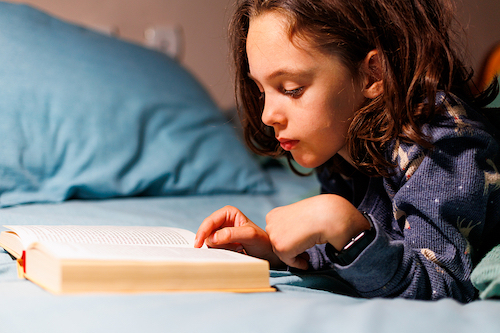 Children who read for pleasure experience better mental health during adolescence as well as superior performance in cognitive tests.
Children who read for pleasure experience better mental health during adolescence as well as superior performance in cognitive tests.
Research published in Psychological Medicine found that roughly 12 hours of reading per week was the perfect amount associated with an improvement in brain structure.
“We looked at two groups of adolescents, one group had started reading for pleasure at an early age in childhood and the other group had never read for pleasure as a child or had stated reading late in childhood. We studied the brain scans, cognitive test scores, academic performance and mental health symptoms, including anxiety and depression and behaviour, such as aggression and rule-breaking of these two groups of adolescents. The adolescents who had read for pleasure as children at an early age had beneficial effects in all these measure compared with the adolescents who had never read for pleasure or who had started reading for pleasure late in childhood,” Professor Barbara Sahakian, co-author of the study and a researcher at the Department of Psychiatry at the University of Cambridge told Theravive.
To undertake their study, the researchers analyzed data from more than 10 thousand young adolescents.
48% of the adolescents studied commenced reading for pleasure later in their childhood or had limited exposure to reading for pleasure in young childhood.
The researchers found that those who read for pleasure from a young age had improved mental wellbeing in their adolescence. They had fewer behavioral issues, less indications of stress and depression and also showed an enhanced attention span.
“We know that reading is an extremely important life skill for financial and other forms of success as an adult. The years 1 - 5 are crucial for social and emotional cognitive development and form the building blocks for other forms of cognition later in life, such as the executive functions, processes such as planning and problem solving. Reading for pleasure is an enjoyable childhood learning initiative, which is also cognitively enriching and can help lead more broadly to knowledge acquisition and creative thinking,” Sahakian said.
The children who read for pleasure from an early age also spent less time in front of screens, both on the weekends and during the week during their adolescence. They also slept for longer than their peers who didn’t engage in reading for pleasure at a young age.
The researchers argue that reading for pleasure could be an important strategy to ensure the wellbeing of adolescents.
“Our brains are still in development through late adolescence and early young adulthood, therefore adolescence is an important topic for study as we want to ensure that all adolescents have good brain health, cognition and wellbeing. Adolescence is the transition between being a child to becoming an adult and so interventions in childhood that are beneficial for cognition, school academic attainment and mental health are extremely important. Many mental health disorders begin in childhood or adolescence, so improving mental health during these developmental periods is crucial. Reading for pleasure in childhood is a relatively low-cost intervention. With the COVID-19 pandemic lockdowns in many countries including the UK, reading for pleasure might be a protective intervention for cognition and mental health,” Sahakian said.
“We hope that this study which provides strong evidence for the benefits of reading for pleasure in early childhood will encourage parents and teachers in schools to place greater emphasis on this important and enjoyable activity, which is good for the brain, cognition, academic performance and mental health in adolescents. We hope that parents, teachers and governments will focus on reading for pleasure in early childhood and use this intervention at home, in play groups and in primary schools. Not only is reading for pleasure enjoyable for young children, but it stimulates creative thinking, imagination and speech through discussion of the pictures and stories.”
Elizabeth Pratt is a medical journalist and producer. Her work has appeared on Healthline, The Huffington Post, Fox News, The Australian Broadcasting Corporation, The Sydney Morning Herald, News.com.au, Escape, The Cusp and Skyscanner. You can read more of her articles here. Or learn more about Elizabeth and contact her via her LinkedIn and Twitter profiles.